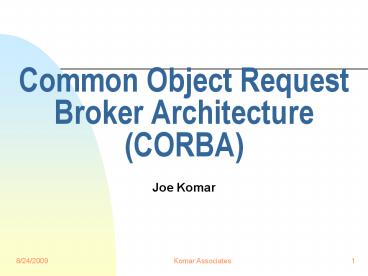Common Object Request Broker Architecture CORBA - PowerPoint PPT Presentation
1 / 22
Title:
Common Object Request Broker Architecture CORBA
Description:
Developed by the Object Management Group (OMG) consortium ... Hello.java - Java version of interface (extends org.omg.Corba.Object) ... – PowerPoint PPT presentation
Number of Views:342
Avg rating:3.0/5.0
Title: Common Object Request Broker Architecture CORBA
1
Common Object Request Broker Architecture (CORBA)
- Joe Komar
2
CORBA Overview
- Standard distributed object architecture
- Developed by the Object Management Group (OMG)
consortium - Open software bus (Object Request Broker(ORB))
- CORBA objects can invoke one another without
knowing where the objects reside and in what
language they are implemented
3
Interface Definition Language
- Defines interfaces to CORBA objects
- Mappings to Java, C, C, Smalltalk, COBOL, and
Ada - Java IDL
- ORB with JDK 1.2
- Allows access to CORBA objects from Java
- Compliant with CORBA/IIOP 2.0 spec and the
IDL-to-Java Mapping
4
Overview of CORBA
Client
Server
Stubs
Skeletons
IIOP
ORB
ORB
Method Request
5
CORBA Concepts
- Client obtains an object reference
- Reference points to a stub
- Stub uses the ORB mechanism to forward method
invocations - Skeleton code transforms the call and parameters
to implementation specific format and calls the
object - Results returned via the same mechanisms
6
Interface Definition Language
- All CORBA objects support an IDL interface
- Interface defines the object type
- Interface can inherit from one or more interfaces
- Syntax is very similar to Java or C
- IDL is mapped to specific languages to provide
access from that language - idltojava compiler translates IDL to Java --
interface, stub, skeleton, and others as needed
7
IDL Example
Module HelloApp interface Hello
string sayHello()
8
Java Specific CORBA Server
- Write IDL (.idl file)
- Use idltojava compiler and generate .java files
- Write server code to implement interface
- Server implementation compiled and linked to
other files and the ORB library - Define a factory object interface and implement
it for each object type (Only a server may create
CORBA objects)
9
Java Specific Client
- Clients create objects through the factory
- Obtain object references
- from a factory object -- e.g., invoke a
create method which returns the object
reference - from the nameservice
- from a string specifically created from an object
reference - Reference is then narrowed using a helper class
generated by idltojava compiler
10
Transient Name Server
- Java IDL Transient Nameservice
- Type tnameserv at the operating system prompt
- Stores object references by name in a tree
structure - Clients lookup or resolve object references by
name - All names are lost when tnameserv stops running
11
Hello World IDL
Module HelloApp interface Hello
string sayHello()
12
Idltojava Hello.idl
- Generates the following files in the HelloApp
subdirectory - _HelloImplBase.java - server skeleton
- _HelloStub.java - client stub
- Hello.java - Java version of interface (extends
org.omg.Corba.Object) - HelloHelper.java - narrow() method
- HelloHolder.java - public instance member of type
Hello. Provides operations for out and inout
arguments needed by CORBA
13
HelloServer.java
- Implements all the methods of the interface
- main() method must
- Create an ORB instance
- Create a servant instance and tells the ORB about
it - Gets a CORBA object reference for a naming
context - Registers the new object in the naming context
- Waits for invocations of the new object
14
HelloServer.java code
import HelloApp. import org.omg.CosNaming. imp
ort org.omg.CosNaming.NamingContextPackage. impo
rt org.omg.CORBA. class HelloServant extends
_HelloImplBase public String sayHello()
return "\nHello world !!\n"
15
HelloServer Code
public class HelloServer public static
void main(String args) try
// create and initialize the ORB
ORB orb ORB.init(args, null) //
create servant and register it with the ORB
HelloServant helloRef new
HelloServant() orb.connect(helloRef)
// get the root naming context
org.omg.CORBA.Object objRef
orb.resolve_initial_references("NameService")
NamingContext ncRef
NamingContextHelper.narrow(objRef)
16
HelloServer Code
// bind the Object Reference in Naming
NameComponent nc new NameComponent("Hello",
"") NameComponent path nc
ncRef.rebind(path, helloRef)
// wait for invocations from clients
java.lang.Object sync new java.lang.Object()
synchronized (sync)
sync.wait() catch
(Exception e) System.err.println("ER
ROR " e) e.printStackTrace(System.
out)
17
HelloClient.java Implementation
- Creates an ORB
- Obtains a reference to the naming context
- Looks up Hello in the naming context and
receives a reference to that CORBA object - Invokes the objects method and prints results
18
HelloClient Code
import HelloApp. import org.omg.CosNaming. imp
ort org.omg.CORBA. public class HelloClient
public static void main(String args)
19
HelloClient Code
try // create and initialize the ORB
ORB orb ORB.init(args, null)
// get the root naming context
org.omg.CORBA.Object objRef orb.resolve_initial_
references("NameService")
NamingContext ncRef NamingContextHelper.narrow(o
bjRef) // resolve the Object
Reference in Naming NameComponent nc
new NameComponent("Hello", "")
NameComponent path nc Hello
helloRef HelloHelper.narrow(ncRef.resolve(path))
20
HelloClient Code
// call the Hello server object and
print results String hello
helloRef.sayHello()
System.out.println(hello) catch
(Exception e) System.out.println("ER
ROR " e) e.printStackTrace(Syste
m.out)
21
Building and Running the Example
- idltojava Hello.idl -- to created files
- java .java HelloApp\.java -- to compile all
programs - tnameserv -ORBInitialPort 1050 -- to run the
name server - java HelloServer -ORBInitialPort 1050 -- to start
the server - java HelloClient -ORBInitialPort 1050 -- to run
the client
22
Client/Server Summary
- CORBA is the primary way to link Java to objects
written in other languages - RMI can also be used if its all Java
- DCOM is the primary competitor to CORBA, but runs
on limited platforms - Sockets are too low level for enterprise use
- CGI is very slow, with servlets being
substantially faster, but still slow































